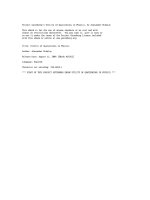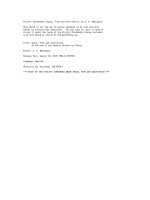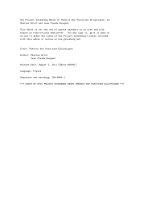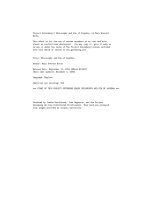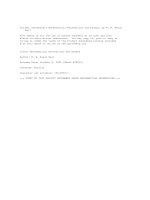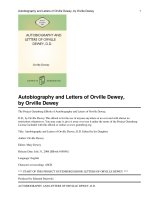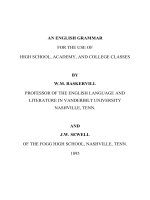Project Gutenberg’s Philosophy and Fun of Algebra, by Mary Everest Boole This eBook is for the use pdf
Bạn đang xem bản rút gọn của tài liệu. Xem và tải ngay bản đầy đủ của tài liệu tại đây (269.08 KB, 56 trang )
Project Gutenberg’s Philosophy and Fun of Algebra, by Mary Everest
Boole
This eBook is for the use of anyone anywhere at no cost and with
almost no restrictions whatsoever. You may copy it, give it away or
re-use it under the terms of the Project Gutenberg License included
with this eBook or online at www.gutenberg.net
Title: Philosophy and Fun of Algebra
Author: Mary Everest Boole
Release Date: September 12, 2004 [EBook #13447]
[Date last updated: December 3, 2005]
Language: English
Character set encoding: TeX
*** START OF THIS PROJECT GUTENBERG EBOOK PHILOSOPHY AND FUN OF ALGEBRA ***
Produced by Joshua Hutchinson, John Hagerson, and the Project
Gutenberg On-line Distributed Proofreaders. This book was produced
from images provided by Cornell University.
i
PHILOSOPHY & FUN
OF ALGEBRA
BY
MARY EVEREST BOOLE
AUTHOR OF
“PREPARATION OF THE CHILD FOR SCIENCE,” ETC.
LONDON: C. W. DANIEL, LTD.
3 Tudor Street, E.C. 4.
ii
Production Note
Cornell University Library produced this volume to replace the irreparably
deteriorated original. It was scanned using Xerox software and equipment at 600
dots per inch resolution and compressed prior to storage using CCITT Group 4
compression. The digital data were used to create Cornell’s replacement volume
on paper that meets the ANSI Standard Z39.48-1984. The production of this
volume was supported in part by the Commission on Preservation and Access
and the Xerox Corporation. 1990.
BOUGHT WITH THE INCOME OF THE
SAGE ENDOWMENT FUND
THE GIFT OF
HENRY W. SAGE
1891
iii
Works by
MARY EVEREST BOOLE
Logic Taught By Love. 3s. 6d. net.
Mathematical Psychology of Gratry and
Boole for Medical Students. 3s. 6d. net.
Boole’s Psychology as a Factor in Education. 6d. net.
The Message of Psychic Science to the World. 3s. 6d. net.
Mistletoe and Olive. 1s. 6d. net.
Miss Education and Her Garden. 6d. net.
Philosophy and Fun of Algebra. 2s. net.
C.W. DANIEL.
The Preparation of the Child for Science. 2s.
The Logic of Arithmetic. 2s.
CLARENDON PRESS.
iv
To
BASIL and MARGARET
My Dear Children,
A young monkey named Genius picked a green walnut, and bit, through a
bitter rind, down into a hard shell. He then threw the walnut away, saying:
“How stupid people are! They told me walnuts are good to eat.”
His grandmother, whose name was Wisdom, picked up the walnut—peeled
off the rind with her fingers, cracked the shell, and shared the kernel with her
grandson, saying: “Those get on best in life who do not trust to first impressions.”
In some old books the story is told differently; the grandmother is called Mrs
Cunning-Greed, and she eats all the kernel herself. Fables about the CunningGreed family are written to make children laugh. It is good for you to laugh;
it makes you grow strong, and gives you the habit of understanding jokes and
not being made miserable by them. But take care not to believe such fables;
because, if you believe them, they give you bad dreams.
MARY EVEREST BOOLE.
January 1909.
Contents
1 From Arithmetic To Algebra
1
2 The Making of Algebras
4
3 Simultaneous Problems
6
4 Partial Solutions. . . Elements of Complexity
8
5 Mathematical Certainty. . .
10
6 The First Hebrew Algebra
12
7 How to Choose Our Hypotheses
15
8 The Limits of the Teacher’s Function
19
9 The Use of Sewing Cards
21
10 The Story of a Working Hypothesis
23
11 Macbeth’s Mistake
26
12 Jacob’s Ladder
28
13 The Great x of the World
29
14 Go Out of My Class-Room
√
15 −1
31
33
16 Infinity
34
17 From Bondage to Freedom
36
18 Appendix
38
v
Chapter 1
From Arithmetic To
Algebra
Arithmetic means dealing logically with facts which we know (about questions
of number).
“Logically”; that is to say, in accordance with the “Logos” or hidden wisdom,
i.e. the laws of normal action of the human mind.
For instance, you are asked what will have to be paid for six pounds of sugar
at 3d. a pound. You multiply the six by the three. That is not because of any
property of sugar, or of the copper of which the pennies are made. You would
have done the same if the thing bought had been starch or apples. You would
have done just the same if the material had been tea at 3s. a pound. Moreover,
you would have done just the same kind of action if you had been asked the price
of seven pounds of tea at 2s. a pound. You do what you do under direction of
the Logos or hidden wisdom. And this law of the Logos is made not by any King
or Parliament, but by whoever or whatever created the human mind. Suppose
that any Parliament passed an act that all the children in the kingdom were
to divide the price by the number of pounds; the Parliament could not make
the answer come right. The only result of a foolish Act of Parliament like that
would be that everybody’s sums would come wrong, and everybody’s accounts
be in confusion, and everybody would wonder why the trade of the country was
going to the bad.
In former times there were kings and emperors quite stupid enough to pass
Acts like that, but governments have grown wiser by experience and found out
that, as far as arithmetic goes, there is no use in ordering people to go contrary
to the laws of the Logos, because the Logos has the whip hand, and knows its
own business, and is master of the situation. Therefore children now are allowed
to study the laws of the Logos, whenever the business on hand is finding out
how much they are to pay in a shop.
Sometimes your teachers set you more complicated problems than:—What
is the price of six pounds of sugar? For instance:—In what proportion must one
1
CHAPTER 1. FROM ARITHMETIC TO ALGEBRA
2
mix tea bought at 1s. 4d. a pound with tea bought at 1s. 10d. a pound so as to
make 5 per cent. profit by selling the mixture at 1s. 9d. a pound?
Arithmetic, then, means dealing logically with certain facts that we know,
about number, with a view to arriving at knowledge which as yet we do not
possess.
When people had only arithmetic and not algebra, they found out a surprising amount of things about numbers and quantities. But there remained
problems which they very much needed to solve and could not. They had to
guess the answer; and, of course, they usually guessed wrong. And I am inclined
to think they disagreed. Each person, of course, thought his own guess was nearest to the truth. Probably they quarrelled, and got nervous and overstrained
and miserable, and said things which hurt the feelings of their friends, and
which they saw afterwards they had better not have said—things which threw
no light on the problem, and only upset everybody’s mind more than ever. I
was not there, so I cannot tell you exactly what happened; but quarrelling and
disagreeing and nerve-strain always do go on in such cases.
At last (at least I should suppose this is what happened) some man, or
perhaps some woman, suddenly said: “How stupid we’ve all been! We have
been dealing logically with all the facts we knew about this problem, except
the most important fact of all, the fact of our own ignorance. Let us include
that among the facts we have to be logical about, and see where we get to then.
In this problem, besides the numbers which we do know, there is one which
we do not know, and which we want to know. Instead of guessing whether
we are to call it nine, or seven, or a hundred and twenty, or a thousand and
fifty, let us agree to call it x, and let us always remember that x stands for the
Unknown. Let us write x in among all our other numbers, and deal logically
with it according to exactly the same laws as we deal with six, or nine, or a
hundred, or a thousand.”
As soon as this method was adopted, many difficulties which had been puzzling everybody fell to pieces like a Rupert’s drop when you nip its tail, or
disappeared like bats when the sun rises. Nobody knew where they had gone
to, and I should think that nobody cared. The main fact was that they were no
longer there to puzzle people.
A little girl was once saying the Evening Hymn to me, “May no ill dreams
disturb my rest, No powers of darkness me molest.” I asked if she knew what
Powers of Darkness meant. She said, “The wolves which I cannot help fancying
are under my bed when all the time I know they are not there. They must be
the Powers of Darkness, because they go away when the light comes.”
Now that is exactly what happened when people left off disputing about
what they did not know, and began to deal logically with the fact of their
own ignorance. This method of solving problems by honest confession of one’s
ignorance is called Algebra.1
The name Algebra is made up of two Arabic words.
The science of Algebra came into Europe through Arabs, and therefore is
1 See
Appendix.
CHAPTER 1. FROM ARITHMETIC TO ALGEBRA
3
called by its Arabic name. But it is believed to have been known in India before
the Arabs got hold of it.
Any fact which we know or have been told about our problem is called a
datum. The number of pounds of sugar we are to buy is one datum; the price
per pound is another.
The plural of datum is data. It is a good plan to write all one’s data on one
column or page of the paper and work one’s sum on the other. This leaves the
first column clear for adding to one’s data if one finds out any fresh one.
Chapter 2
The Making of Algebras
The Arabs had some cousins who lived not far off from Arabia and who called
themselves Hebrews. A taste for Algebra seems to have run in the family. Three
Algebras grew up among the Hebrews; I should think they are the grandest and
most useful that ever were heard of or dreamed of on earth.
One of them has been worked into the roots of all our science; the second is
much discussed among persons who have leisure to be very learned. The third
has hardly yet begun to be used or understood in Europe; learned men are only
just beginning to think about what it really means. All children ought to know
about at least the first of these.
But, before we begin to talk about the Hebrew Algebras, there are two or
three things that we must be quite clear about.
Many people think that it is impossible to make Algebra about anything
except number. This is a complete mistake. We make an Algebra whenever we
arrange facts that we know round a centre which is a statement of what it is
that we want to know and do not know; and then proceed to deal logically with
all the statements, including the statement of our own ignorance.
Algebra can be made about anything which any human being wants to know
about. Everybody ought to be able to make Algebras; and the sooner we begin
the better. It is best to begin before we can talk; because, until we can talk, no
one can get us into illogical habits; and it is advisable that good logic should
get the start of bad.
If you have a baby brother, it would be a nice amusement for you to teach
him to make Algebra when he is about ten months or a year old. And now I
will tell you how to do it.
Sometimes a baby, when it sees a bright metal tea-pot, laughs and crows
and wants to play with the baby reflected in the metal. It has learned, by what
is called “empirical experience,” that tea-pots are nice cool things to handle.
Another baby, when it sees a bright tea-pot, turns its head away and screams,
and will not be pacified while the tea-pot is near. It has learned, by empirical
experience, that tea-pots are nasty boiling hot things which burn one’s fingers.
Now you will observe that both these babies have learnt by experience.
4
CHAPTER 2. THE MAKING OF ALGEBRAS
5
Some people say that experience is the mother of Wisdom; but you see that
both babies cannot be right; and, as a matter of fact, both are wrong. If they
could talk, they might argue and quarrel for years; and vote; and write in the
newspapers; and waste their own time and other people’s money; each trying to
prove he was right. But there is no wisdom to be got in that way. What a wise
baby knows is that he cannot tell, by the mere look of a tea-pot, whether it is hot
or cold. The fact that is most prominent in his mind when he sees a tea-pot is
the fact that he does not know whether it is hot or cold. He puts that fact along
with the other fact:—that he would very much like to play with the picture in
the tea-pot supposing it would not burn his fingers; and he deals logically with
both these facts; and comes to the wise conclusion that it would be best to go
very cautiously and find out whether the tea-pot is hot, by putting his fingers
near, but not too near. That baby has begun his mathematical studies; and
begun them at the right end. He has made an Algebra for himself. And the
best wish one can make for his future is that he will go on doing the same for
the rest of his life.
Perhaps the best way of teaching a baby Algebra would be to get him thoroughly accustomed to playing with a bright vessel of some kind when cold; then
put it and another just like it on the table in front of him, one being filled with
hot water. Let him play with the cold one; and show him that you do not wish
him to play with the other. When he persists, as he probably will, let him find
out for himself that the two things which look so alike have not exactly the
same properties. Of course, you must take care that he does not hurt himself
seriously.
Chapter 3
Simultaneous Problems
It often happens that two or three problems are so entangled up together that
it seems impossible to solve any one of them until the others have been solved.
For instance, we might get out three answers of this kind:—
x equals half of y;
y equals twice x;
z equals x multiplied by y.
The value of each depends on the value of the others.
When we get into a predicament of this kind, three courses are open to us.
We can begin to make slap-dash guesses, and each argue to prove that his
guess is the right one; and go on quarrelling; and so on; as I described people
doing about arithmetic before Algebra was invented.
Or we might write down something of this kind:—
The values cannot be known. There is no answer to our problem.
We might write:—
x is the unknowable;
y is non-existent;
z is imaginary,
and accept those as answers and give them forth to the world with all the
authority which is given by big print, wide margins, a handsome binding, and
a publisher in a large way of business; and so make a great many foolish people
believe we are very wise.
Some people call this way of settling things Philosophy; others call it arrogant
conceit. Whatever it is, it is not Algebra. The Algebra way of managing is
this:—
We say: Suppose that x were Unity (1); what would become of y and z?
Then we write out our problem as before; only that, wherever there was x, we
now write 1.
6
CHAPTER 3. SIMULTANEOUS PROBLEMS
7
If the result of doing so is to bring out some such ridiculous answer as “2
and 3 make 7,” we then know that x cannot be 1. We now add to our column
of data, “x cannot be 1.”
But if we come to a truism, such as “2 and 3 make 5,” we add to our column
of data, “x may be 1.” Some people add to their column of data, “x is 1,” but
that again is not Algebra. Next we try the experiment of supposing x to be
equal to zero (0), and go over the ground again.
Then we go over the same ground, trying y as 1 and as 0.
And then we try the same with z. Some people think that it is waste of time
to go over all this ground so carefully, when all you get by it is either nonsense,
such as “2 and 3 are 7”; or truisms, such as “2 and 3 are 5.” But it is not waste
of time. For, even if we never arrive at finding out the value of x, or y, or z,
every conscientious attempt such as I have described adds to our knowledge of
the structure of Algebra, and assists us in solving other problems.
Such suggestions as “suppose x were Unity” are called “working hypotheses,”
or “hypothetical data.” In Algebra we are very careful to distinguish clearly
between actual data and hypothetical data.
This is only part of the essence of Algebra, which, as I told you, consists in
preserving a constant, reverent, and conscientious awareness of our own ignorance.
When we have exhausted all the possible hypotheses connected with Unity
and Zero, we next begin to experiment with other values of x; e.g.—suppose x
were 2, suppose x were 3, suppose it were 4. Then, suppose it were one half, or
one and a half, and so on, registering among our data, each time, either “x may
be so and so,” or “x cannot be so and so.”
The method of finding out what x cannot be, by showing that certain suppositions or hypotheses lead to a ridiculous statement, is called the method of
reductio ad absurdum. It is largely used by Euclid.
Chapter 4
Partial Solutions and the
Provisional Elimination of
Elements of Complexity
Suppose that we never find out for certain whether x is unity or zero or something else, we then begin to experiment in a different direction. We try to find
out which of the hypothetical values of x throw most light on other questions,
and if we find that some particular value of x—for instance, unity—makes it
easier than does any other value to understand things about y and z, we have
to be very careful not to slip into asserting that x is unity. But the teacher
would be quite right in saying to the class, “For the present we will leave alone
thinking about what would happen if x were something different from unity,
and attend only to such questions as can be solved on the supposition that x
is unity.” This is what is called in Algebra “provisional elimination of some
elements of complexity.”
It might happen that one of the older pupils, specially clever at mathematics, but not very well disciplined, should start some point connected with the
supposition that x is something different than unity. It would be the teacher’s
business to remind her: “At present we are dealing with the supposition that x
is unity. When we have exhausted that subject we will investigate your question. But, till then, please do not distract the attention of the class by talking
about what is not the business on hand at present.”
If the girl forgot, the teacher might say: “I should very much like you to try
your own suggestion in private, but please do not talk about it in class till I give
you leave.”
If she forgot again, the teacher might say,—I think I should be inclined to
say:—“If you cannot remember not to distract the class by talking about what
is irrelevant to the business on hand, I shall have to request you to keep outside
my class-room till you can.”
In an orderly school the teachers have time to be polite, and it is their
8
CHAPTER 4. PARTIAL SOLUTIONS. . . ELEMENTS OF COMPLEXITY 9
business to set the example of being so. In history, especially such history
as that of half-civilised countries 3000 years ago, teachers were under too much
strain to cultivate either a polite manner of saying things, or, what is of far more
consequence, that genuine intellectual courtesy which is the absolutely necessary
condition for the development of any really perfect mathematical system. The
great Hebrew Algebra, therefore, never became quite perfect. It was only rough
hewn, so to speak; and its manners and customs were rough too. The teachers
had ways of saying, “Hold your tongue, or else go out of my class-room,” which
perhaps we should now call bigoted and brutal. But what I want you to notice
is that “Hold your tongue, or get out of my class-room,” is not the same thing
as “My hypothesis is right, and yours ought not to be tried anywhere.”
This latter is contrary to the essential basis of Algebra, viz., a recognition
of one’s own ignorance.
The other, a rough way of saying “Get out of my class-room,” is only contrary to that fine intellectual courtesy which is essential to the perfection of
mathematical method.
Chapter 5
Mathematical Certainty
and Reductio ad Absurdum
It is very often said that we cannot have mathematical certainty about anything
except a few special subjects, such as number, or quantity, or dimensions.
Mathematical certainty depends, not on the subject matter of our investigation, but upon three conditions. The first is a constant recognition of the limits
of our own knowledge and the fact of our own ignorance. The second is reverence for the As-Yet-Unknown. The third is absolute fearlessness in meeting the
reductio ad absurdum. In mathematics we are always delighted when we come
to any such conclusion as 2 + 3 = 7. We feel that we have absolutely cleared
out of the way one among the several possible hypotheses, and are ready to try
another.
We may be still groping in the dark, but we know that one stumbling-block
has been cleared out of our path, and that we are one step “forrader” on the
right road. We wish to arrive at truth about the state of our balance sheet,
the number of acres in our farm, the time it will take us to get from London
to Liverpool, the height of Snowdon, the distance of the moon, and the weight
of the sun. We have no desire to deceive ourselves upon any of these points,
and therefore we have no superstitious shrinking from the rigid reductio ad
absurdum. On some other subjects people do wish to be deceived. They dislike
the operation of correcting the hypothetical data which they have taken as basis.
Therefore, when they begin to see looming ahead some such ridiculous result as
2 + 3 = 7, they shrink into themselves and try to find some process of twisting
the logic, and tinkering the equation, which will make the answer come out a
truism instead of an absurdity; and then they say, “Our hypothetical premiss
is most likely true because the conclusion to which it brings us is obviously and
indisputably true.”
If anyone points out that there seems to be a flaw in the argument, they say,
“You cannot expect to get mathematical certainty in this world,” or “You must
not push logic too far,” or “Everything is more or less compromise,” and so on.
10
CHAPTER 5. MATHEMATICAL CERTAINTY. . .
11
Of course, there is no mathematical certainty to be had on those terms. You
could have no mathematical certainty about the amount you owed your grocer
if you tinkered the process of adding up his bill. I wish to call your attention to
the fact that even in this world there is a good deal of mathematical certainty
to be had by whosoever has endless patience, scrupulous accuracy in stating his
own ignorance, reverence for the As-Yet-Unknown, and perfect fearlessness in
meeting the reductio ad absurdum.
Chapter 6
The First Hebrew Algebra
The first Hebrew algebra is called Mosaism, from the name of Moses the Liberator, who was its great Incarnation, or Singular Solution. It ought hardly to be
called an algebra: it is the master-key of all algebras, the great central director
for all who wish to learn how to get into right relations to the unknown, so that
they can make algebras for themselves. Its great keynotes are these:—
When you do not know something, and wish to know it, state that you do
not know it, and keep that fact well in front of you.
When you make a provisional hypothesis, state that it is so, and keep that
fact well in front of you.
While you are trying out that provisional hypothesis, do not allow yourself
to think, or other people to talk to you, about any other hypothesis.
Always remember that the use of algebra is to free people from bondage. For
instance, in the case of number: Children do their numeration, their “carrying,”
in tens, because primitive man had nothing to do sums with but his ten fingers.
Many children grow superstitious, and think that you cannot carry except
in tens; or that it is wrong to carry in anything but tens. The use of algebra
is to free them from bondage to all this superstitious nonsense, and help them
to see that the numbers would come just as right if we carried in eights or
twelves or twenties. It is a little difficult to do this at first, because we are not
accustomed to it; but algebra helps to get over our stiffness and set habits and
to do numeration on any basis that suits the matter we are dealing with.
Of course, we have to be careful not to mix two numerations. If we are
working a sum in tens, we must go on working in tens to the end of that sum.
Never let yourself get fixed ideas that numbers (or anything else that you are
working at) will not come right unless your sum is set or shaped in a particular
way. Have a way in which you usually do a particular kind of sum, but do not
let it haunt you.
You may some day become a teacher. If ever you are teaching a class how
to set down a sum or an equation, say “This is my way,” or “This is the way
which I think you will find most convenient,” or “This is the way in which the
Government Inspector requires you to do the sums at present, and therefore you
12
CHAPTER 6. THE FIRST HEBREW ALGEBRA
13
must learn it.” But do not take in vain the names of great unseen powers to
back up either your own limitations, or your own authority, or the Inspector’s
authority. Never say, or imply, “Arithmetic requires you to do this; your sum
will come wrong if you do it differently.” Remember that arithmetic requires
nothing from you except absolute honesty and patient work. You get no blessing
from the Unseen Powers of Number by slipshod statements used to make your
own path easy.
Be very accurate and plodding during your hours of work, but take care not
to go on too long at a time doing mere drudgery. At certain times give yourself
a full stretch of body and mind by going to the boundless fairyland of your
subject. Think how the great mathematicians can weigh the earth and measure
the stars, and reveal the laws of the universe; and tell yourself that it is all
one science, and that you are one of the servants of it, quite as much as ever
Pythagoras or Newton were.
Never be satisfied with being up-to-date. Think, in your slack time, of how
people before you did things. While you are at school my little book, Logic of
Arithmetic, will help you to find out many things about your ancestors which
may amuse and interest you; but, as soon as you leave school and choose your
own reading, take care to read up the histories of the struggles and difficulties of
the people who formerly dealt with your own subject (whatever that may be).
If you find the whole of the data too complicated to deal with, and judge
that it is necessary to eliminate one or more of them, in order to reduce your
material within the compass of your own power to manage, do it as a provisional
necessity. Take care to register the fact that you have done so, and to arrange
your mind, from the first, on the understanding that the eliminated data will
have to come back. Forget them during the working out of your experimental
equation; but never give way to the feeling that they are got rid of and done
with.
Be very careful not to disturb other people’s relationships to each other. For
instance, if a teacher is explaining something to another pupil, never speak till
she has done. Beware of the sentimental craving to be “in it.” Any studyinggroup profits by right working relations being set up between any two members;
and ultimately each member profits. The whole group suffers from any distraction between any two. Therefore listen and learn what you can; but never
disturb or distract.1
Take care not to become a parasite; do not lazily appropriate the results of
other people’s labour, but learn and labour truly to get your own living. Take
care that everything you possess, whether physical, mental, or spiritual, shall
be the result of your own toil as well as other people’s; and remember that you
are bound to pay, in some shape or way, everyone who helps you.
Do not make things easy for yourself by speaking or thinking of data as if
they were different from what they are; and do not go off from facing data as
they are, to amuse your imagination by wishing they were different from what
1 D. Marks bases the Seventh Commandment on the desirability of not distracting existing
relations.
CHAPTER 6. THE FIRST HEBREW ALGEBRA
14
they are. Such wishing is pure waste of nerve force, weakens your intellectual
power, and gets you into habits of mental confusion.
When the time comes to stop grind-work, there is no better rest than amusing
your imagination by thinking of non-existent possibilities; but do it on a free,
generous scale. Give yourself a perfectly free rein in the company of the Infinite.
During such exercise of the imagination, remember that you are in the company
of the Infinite, and are not dealing with, or tinkering at, the problem on your
paper.
Keep always at hand, clearly written out, a good standard selection of the
most important formulæ—Arithmetical, Algebraic, Geometric, and Trigonometrical, and accustom yourself to test your results by referring to it.
These are the main laws of mathematical self-guidance. Once upon a time
“Moses” projected them on to the magic-lantern screen of legislation. In that
form they are known as the Ten Commandments; or, to change the metaphors,
we might call the Ten Commandments the outer skin of the mathematical body.
A great many people seem to suppose that, though everyone ought to keep
the Ten Commandments, it does not matter what happens to one’s mind. Just
so, there are people who live unhealthy lives, and think they can make all right
by putting cosmetics on their skin. But I hope you have learned in the hygiene
class how stupid and futile all that is. The way to have a healthy skin is to grow
it, by leading a hygienic life on a moderate allowance of pure wholesome food,
and taking a proper amount of exercise in pure fresh air. People who do that
with their minds grow the Ten Commandments naturally, just as Moses grew
them. The world has been trying the other plan—bad food and air inside, and
cosmetics outside—for at least 4000 years; and not much seems to have come of
it yet. The Ten Commandments have not yet succeeded in getting themselves
kept. Perhaps that is why some schoolmasters and mistresses think they would
like to try the other plan now. Still, it is very good to have a normal model
of what a healthy human being ought to look like outside. It is good to have
a standard for reference. Therefore do not get too much immersed in the mere
details of your own problems. Learn the Ten Commandments and a few other
old standard formularies by heart, and repeat them every now and then. And
say to yourself, “If I really am doing my algebra quite rightly, this (the standard
formularies) is how I shall think and feel and wish. I shall wish to behave thus,
not because anybody ordered me to do so, but from sheer liking and sense of
the general fitness of things.”
Chapter 7
How to Choose Our
Hypotheses
The faculties by means of which we get our positive data are called the senses
(sight, hearing, etc.).
The faculty by means of which we get our hypothetical data is called the
Imagination.
Some persons are prone to warn young people against what they call an
excessive exercise of the imagination. Of course, to say that “excessive” anything
is too much is a mere truism, but nobody knows yet what is the proper amount
of use for the imagination. What we do know is that there is a good deal of
excessive mis-use of the imagination, by which I mean that there is a frightful
amount of using it contrary to the laws of its normal action. A kind of use of it,
such as, when we find a child doing it with its eyes, we say, “Do not learn the
habit of squinting”; or if it does the analogous thing with its legs, we say, “Go
and run about, or do some gymnastics; do not stand there lolloping crooked
against the wall.”
Squinting and lolloping crooked are things that it is best to avoid doing much
of with any part of one’s self.
Moreover, it is bad to spend too many hours over either a microscope or a
telescope, or in gazing fixedly at some one-distance range. The eyes need change
of focus. So does the imagination.
There has been in modern Europe a shocking riot in mis-use of the imagination. The remedy is to learn to use it. But the same kind of people who would
like to bandage a child’s eyes lest it should learn to squint, like to bandage the
imagination lest it should wear itself out by squinting.
In a school which professes to be conducted on hygienic principles, we have
nothing to do with that sort of pessimistic quackery. We use the imagination
as freely as the hands and eyes.
But when we come to the end of our arithmetic we do not content ourselves
with guesses; we proceed to algebra–that is to say, to dealing logically with the
15
CHAPTER 7. HOW TO CHOOSE OUR HYPOTHESES
16
fact of our own ignorance. One of the data that we do know is that all great
nerve-centres affect each other. Mis-use of any one tends more or less to produce
distorted action in the others. And, quite apart from that consideration, any
energetic and continued action of one tends more or less to suppress the action
of the others, for the time being, by drawing the blood from the organs which
are the seat of them; and then, when normal circulation is restored, to produce
for a time an unusual sensitiveness in the others. There is nothing abnormal or
wrong in this, provided that we recognise the fact, and, as I said, are careful
to deal logically with the fact of our own ignorance whenever anything happens
either to our eyes or to our imagination which we do not at the moment quite
understand.
If you ever arrive at using your imagination strongly and rightly in the
construction of any sort of algebra, you may find that it affects to some extent
your sense-organs. It certainly will affect them more or less whether you know
it or not. What I mean is that it may affect them in a way that forces you to
be aware of the fact. If ever this should happen, take it quite naturally; and as
long as you are too young to understand how it happens, just say to yourself,
“This is x, one of the things that I do not know, and perhaps shall know some
day if I go on quietly acting in accordance with strict logic, and remembering
my own ignorance.”
The ancient Hebrews used their imaginations very freely, and sometimes
really very logically. And sometimes the free use of the imagination produced
sensations in the eyes and ears as if of seeing and hearing. They considered this
quite natural, as it really was. Many great mathematicians in modern Europe
have had these sensations.
The Hebrews called these sensations by a Hebrew word which is translated by
the English word “angel,” from the Greek “angelos,” a messenger. The Hebrews
were quite right. The sensations are messengers from the Great Unknown. They
bring no information about outside facts. No angel tells you how many petals
there are in a buttercup; if you want to know that, you are supposed to ask the
buttercup itself. No angel tells you the price of sugar; you ought to ask your
grocer. No angel tells you how to invest your money; you ought to ask your
banker or your lawyer. There are people foolish enough to ask angels about
investments, or about which horse will win a race; which is just as foolish as
asking your banker in town how many blossoms there are on the rose tree in
your country garden. It is not his business, and if he made a guess it would most
likely turn out a wrong one. All that sort of thing is quackery and superstition.
But the angels do bring us very reliable information from a vast region of
valuable truth about which most of us know very little as yet. They guide us how
to frame our next provisional working hypothesis, how to choose the particular
hypothesis which at our present stage of knowledge and development will be
most illuminating for us. Some of the angels come during sleep; we call them
dreams. Dreams sometimes suggest the best working hypothesis to experiment
on next. More often they warn us against thinking upon some hypothetical
basis which for the present will not suit us.
And here comes in the value of such formulæ as the Ten Commandments.
CHAPTER 7. HOW TO CHOOSE OUR HYPOTHESES
17
They are the laws of the normal working of the brain machinery.
The angel (or imaginary messenger) suggests to you the one among possible working hypotheses on which your brain will most readily work. Now the
formularies of which I spoke give you the laws of healthy brain action. Therefore, if the angel suggests something contrary to the registered formulas, he is
suggesting the hypothesis which you ought carefully to avoid thinking out or
using at that time. It is of all paths towards disease the one which will lead you,
in your present condition, most rapidly towards disease. But if the imaginary
angel suggests nothing contrary to the formularies, then the image or idea which
he suggests is likely to be one on which your mind for the time being can work
safely, and the one along which it can work most easily and profitably.
When your imagination is acting strongly in providing you with working
hypotheses, there are a few little precautions which you ought to observe.
Do not at such times take either very rapid or very much prolonged physical
exercise.
Be rather particular not to eat anything either indigestible or highly flavoured.
Even if you were in the habit of taking any kind of alcoholic stimulant (which,
while you are young, I hope you will not do), avoid it during the process of
framing hypotheses. Be extra careful, at such times, to keep up any routine
exercises of slack muscles and slow breathing which you find suit you.
Take a little extra care, at such times, not to catch cold. You are rather less
liable than usual to take cold at such times; but, on the other hand, you are
less conscious than usual of ordinary physical sensations, and may be very cold
without knowing it. A chill may settle locally, and produce permanent mischief.
Above all, be very careful, while the imaginative fit is on, to avoid letting
the subject as to which your imagination is stirred become the object of either
fun, vanity, or gossip. The vision which you see may quite harmlessly and
legitimately become a source of fun to yourself and your friends at some future
time, but take care never to gossip or joke about it until it has passed from the
condition of imaginative vision to that of working hypothesis. But the most
important precaution of all is incessant reverence for the Great Unknown, the
sacred x: or, in other words, a constant awareness of your own ignorance.
Remember always that Genius means conscientious, careful work on suggestions of the imagination taken as provisional hypotheses.
To take suggestions of the Imagination as fact is Insanity. When you hear
of a man that he has unquestionable genius but is a little mad, that means that
he sometimes takes the products of his imagination as working hypotheses, but
sometimes mistakes them for facts.
All the above precautions may be summed up in one sentence: Remember
that the more active the imagination is, the less the physical and moral instincts
are on the alert; therefore, conscious precaution should supplement instinct at
such times, until self-protection has become so fixed by habit as to become in
its turn automatic and instinctive.
If you observe these precautions you need not fear using your imagination
freely. When you hear of some brilliant imaginative writer who has come to
grief physically, mentally, or morally, after a short and brilliant career, you will
CHAPTER 7. HOW TO CHOOSE OUR HYPOTHESES
18
find it advantageous to try to find out which of the precautions he has been
neglecting.
In future letters I hope to point out to your notice some famous cases of
disaster due to such neglect.
Chapter 8
The Limits of the Teacher’s
Function
One of the greatest causes of mental and moral confusion, as well as of absolute
insanity, in modern Europe, is the fact that numbers of people plunge into the
second and third great Hebrew algebras before they rightly understand the first.
Even if they are silent about their results, this distracts their own minds, and
sows the seeds of bad habits and mental confusion in their own constitutions.
Many of these people give to the world their own wild guesses about the second
and third algebras, and that puts the rest of the world into confusion. We are,
therefore, not going to enter on the question of the second algebra till I have
provided you with the possibility of understanding and practising the first. In
the next few chapters I hope to give you a series of stories of people who used,
and sometimes mis-used, the algebra of Moses, in order that you may see how
to work the rules strictly and how mistakes might creep in.
But, before we begin our stories, there is one principle to which I must call
your attention: it is the business of your teachers at school to see that you
acquire skill in using certain implements or tools; it is not their business nor
mine to decide what use you shall make, when you are grown up, of the skill
which you have acquired. It is their business to see that you learn to read and
to speak properly; it is not their business to decide beforehand whether you
shall recite in public or only read to your own family and your sick friends. It is
their business to see that you know how to sew; but not to settle whether you
shall, in future, make your own clothes or work for the poor. So it is with the
tools of the mind, such as algebra and logic. It is our business to see that you
know how to use algebraic and logical method accurately and skilfully; it is not
our business to decide whether, in the future, you shall use your skill to deceive
other people or to show them the truth. It is our business to see that you do
not deceive yourself, because deceiving yourself distorts your brain and ruins
the possibility of using logical methods skilfully to arrive at the knowledge of
truths.
19

